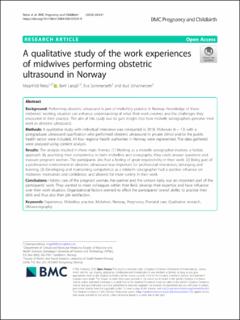A qualitative study of the work experiences of midwives performing obstetric ultrasound in Norway
Journal article, Peer reviewed
Published version
Permanent lenke
https://hdl.handle.net/11250/2685233Utgivelsesdato
2020Metadata
Vis full innførselSamlinger
Originalversjon
Reiso, M., Langli, B., Sommerseth, E., & Johannessen, A. (2020). A qualitative study of the work experiences of midwives performing obstetric ultrasound in Norway. BMC Pregnancy and Childbirth, 20, 641, 1-10. https://doi.org/10.1186/s12884-020-03333-9Sammendrag
Background: Performing obstetric ultrasound is part of midwifery practice in Norway. Knowledge of these midwives’ working situation can enhance understanding of what their work involves and the challenges they encounter in their practice. The aim of this study was to gain insight into how midwife sonographers perceive their work in obstetric ultrasound.
Methods: A qualitative study with individual interviews was conducted in 2018. Midwives (n = 13) with a postgraduate ultrasound qualification who performed obstetric ultrasound in private clinics and/or the public health sector were included. All four regional health authorities in Norway were represented. The data gathered were analysed using content analysis.
Results: The analysis resulted in three main themes. (1) Working as a midwife sonographer involves a holistic approach. By practising their competence, in both midwifery and sonography, they could answer questions and reassure pregnant women. The participants also had a feeling of great responsibility in their work. (2) Being part of a professional environment in obstetric ultrasound was important for professional interaction, belonging and learning. (3) Developing and maintaining competence as a midwife sonographer had a positive influence on midwives’ motivation and confidence, and allowed for more variety in their work.
Conclusions: Holistic care of the pregnant woman, her partner and the unborn baby was an important part of the participants’ work. They wanted to meet colleagues within their field, develop their expertise and have influence over their work situation. Organizational factors seemed to affect the participants’ overall ability to practise their skills and thus also their job satisfaction.

